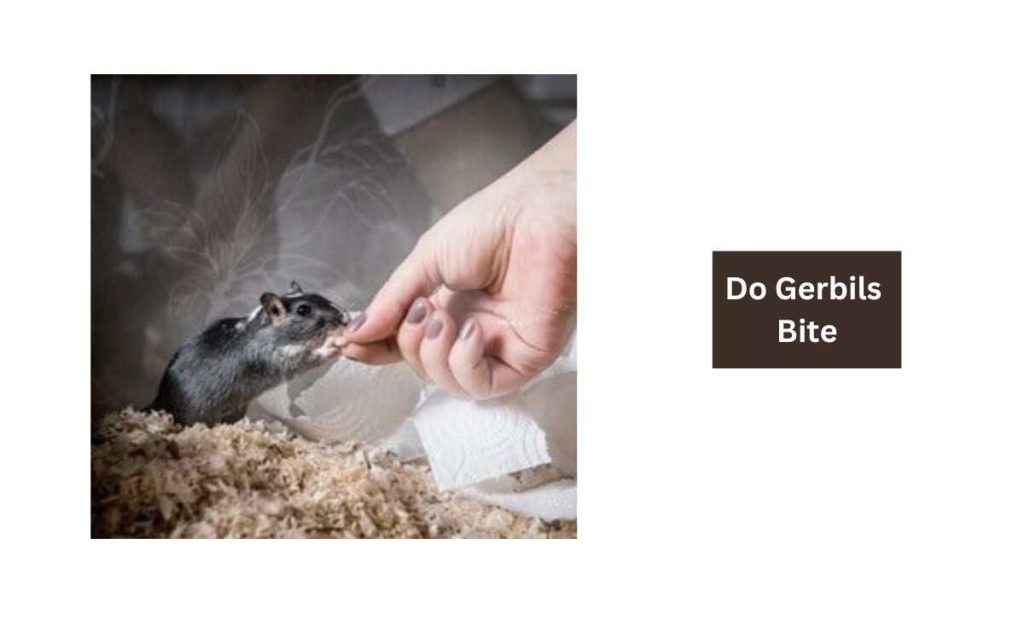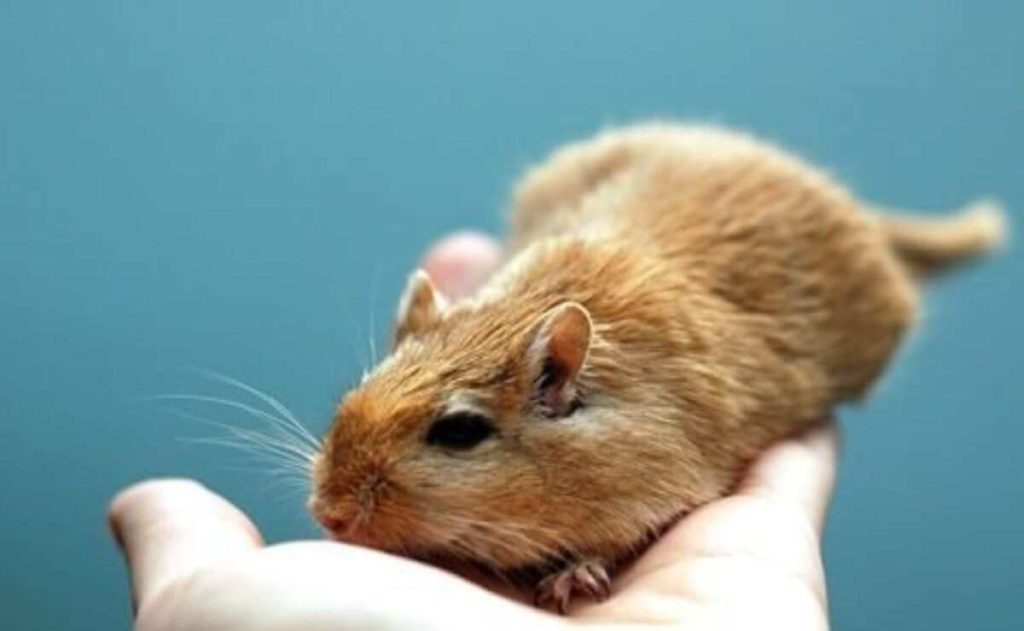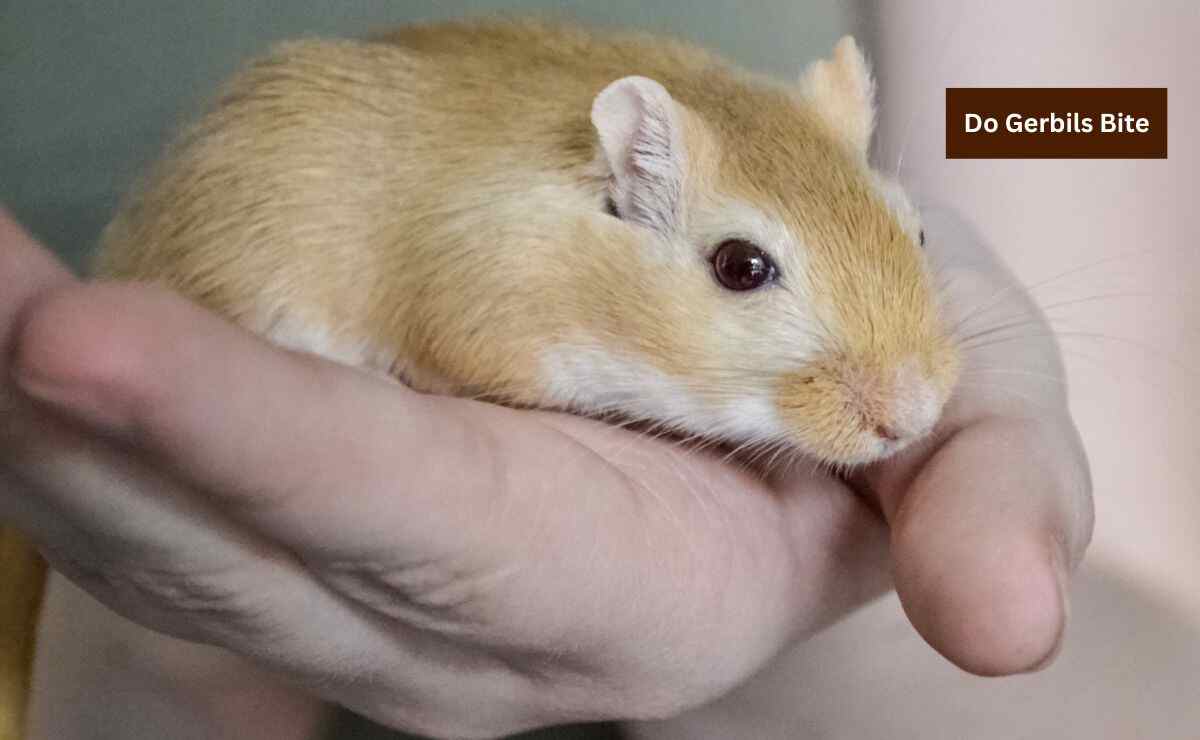Gerbils are very friendly rodents that everyone wants as their first pet. They are generally docile creatures, so many wonder do gerbils bite.
Yes, Gerbils bite. Since gerbils are wild animals, they are used to biting even in captives. Actually, it is their natural defense mechanism that gerbils may use when they feel threatened or scared. Moreover, gerbils possess continuously growing sharp teeth, which might raise concerns about potential bites,
Do Gerbils Bite Their Owners?

Yes, there have been instances where gerbils have bitten their owners, although it’s considered a rare occurrence as biting is not their primary means of defense. Gerbils have agility, and typically opt for a swift escape when feeling threatened, avoiding confrontation altogether.
Gerbils instinctively avoid conflicts and create distance from other disturbing animals. The likelihood of a gerbil resorting to biting increases when it perceives a threat and has no escape route.
This situation commonly arises with new owners who are still learning how to handle their gerbils. Holding the pet too tightly may trigger its fight-or-flight instincts, leading to a bite as it has nowhere to flee within your grasp.
If a gerbil does nip, it’s usually a gentle gesture that doesn’t inflict pain or break the skin. Instances of a gerbil delivering a hard bite, causing discomfort or injury, are rare.
Another potential reason for a gerbil bite could be illness. If you’ve had your gerbil for a significant period and it suddenly bites, it might be signaling an underlying health issue. In cases where the gerbil is in pain due to an injured foot or leg, it may bite, especially if leaving the cage is too uncomfortable.
Why Does My Gerbil Bite Me?
As naturally skittish creatures, gerbils react instinctively to perceived threats, and there are four primary reasons why they bite:
1. Stress: Gerbils can easily become stressed when startled, especially if awakened abruptly or exposed to sudden loud noises. Approaching their cage too quickly or having other animals in close proximity can also cause their stress.
2. Provocation: It’s essential not to push your gerbil’s limits, whether it’s attempting to coax them out of their cage for cleaning or engaging in play. Continuously doing something they dislike may provoke them, leading to a defensive bite.
3. Pain: Like any other creature gerbils resort to biting as a protective measure. This can occur if they’ve had a confrontation with another gerbil or sustained an injury. If they are injured, handling them with care, possibly using gloves, becomes crucial to avoid triggering further pain.
4. Fear: Immediate threats that make a gerbil feel scared, such as chasing them around their cage and they can pose a defensive bite. Moreover, being spooked by sudden noises, unfamiliar pets, or unexpected body movements can lead to biting, especially in the initial stages of getting to know them.
5. Unfamiliar Environment: The unfamiliar environment is a common cause of a scared or stressed gerbil. When bringing a gerbil into a new home, it requires some time for adjustment to acclimate to its surroundings. In such a situation, they may bite you.
Do Gerbils Bite Hurt?

Gerbil bites can be painful as their continuously growing sharp teeth. Yet, the severity of the pain depends on the gerbil’s emotional state at the time of the bite. Gerbils either give a hard bite or a mild nip as a warning, dictated by the level of threat they perceive.
Gerbils can bite forcefully in self-defense if they feel excessively threatened, such as when you are handling them roughly. Conversely, if the gerbil finds a situation mildly irritating, it may resort to a gentle nip, signaling a request for the behavior to cease.
The pain of a gerbil bite varies based on individual pain thresholds. For those with lower pain tolerance, the discomfort can be substantial. Fortunately, the pain typically subsides relatively quickly. If you find yourself on the receiving end of a gerbil bite, running the affected area under cold water can aid in numbing the pain.
What Happens If Gerbils Bite You?
Gerbil’s bite isn’t so dangerous if their teeth don’t penetrate your skin. Due to their bite, you may get bruises, scratches, small cuts, or puncture wounds. If a gerbil’s bite causes a small cut or puncture wound, there is a chance of infection.
Still, their bite poses a risk of infection if not properly cleaned. They carry a substantial amount of bacteria in their mouths, easily transferred through saliva during a bite.
If the skin is broken, you can notice some signs of infection like redness, swelling, and pus formation as white blood cells combat the infection.
To prevent infection, clean the wound by rinsing it under a tap and applying bacterial ointment with a bandage. In case of infection, you can take antibiotics for treatment prescribed by a doctor.
Monitoring the wound is essential to prevent it from worsening. Additionally, while gerbils don’t carry rabies, they may transmit illnesses like Salmonellosis. It is a bacterial infection that can affect humans. Signs of gerbil-transmitted Salmonellosis include diarrhea, dehydration, weight loss, poor fur quality, swollen abdomen, and fetal death in pregnant gerbils.
Another potential infection is lymphocytic choriomeningitis virus (LCMV), transmitted through contact with a gerbil’s urine, droppings, saliva, or bedding. Although rare, it can lead to mild flu-like symptoms in humans, emphasizing the importance of hygiene after a gerbil bite.
How To Avoid Gerbil’s Bite?
Gerbils are social animals and thrive on interaction and companionship. With proper care and handling, it is possible to minimize the chances of your gerbil biting. Here are some tips to prevent and handle gerbil bites:
1. Establish Trust: Building a bond with your gerbil is crucial. Spend time with your gerbil, handle them gently, and provide positive reinforcement with treats to help them associate you with positive experiences.
2. Approach with Caution: When approaching your gerbil, avoid sudden movements or loud noises. This can startle them, increasing the chances of a defensive bite.
3. Respect Their Space: Gerbils need their own space and may become territorial if they feel threatened. Avoid reaching into their enclosure abruptly or invading their area. Instead, give them time to approach you willingly.
4. Proper Handling: When picking up your gerbil, ensure your hands are clean and dry. Support their entire body with your hands, providing a secure grip to reduce their anxiety.
5. Avoid Rough Play: Rough play or teasing can cause stress to your gerbil, leading to defensive behavior such as biting. Always handle them gently and avoid actions that could agitate them.
6. Recognize Warning Signs: Gerbils usually provide warning signs before biting, such as squeaking, hissing, or lunging. If you notice any of these behaviors, give your gerbil some space and time to calm down before attempting to handle them again.
Conclusion
If your gerbil does bite, you need to handle the situation properly. Stay calm and avoid any sudden jerking movements, as this may aggravate the situation. Rinse the wound with mild soap and water, apply an antiseptic, and seek medical attention if necessary.
Remember, not all gerbils will bite, and with proper care and handling, the risk of biting can be significantly reduced.
